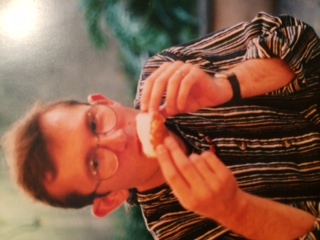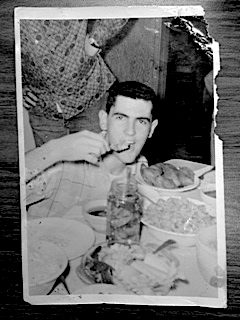José Esteban Muñoz argues that “queerness as utopian formation is a formation based on an economy of desire and desiring. This desire is always directed at that thing that is not yet here, objects and moments that burned with anticipation and promise” (26). My vision of queer family—”I do not remember who played mom or dad or child or whatnot”—was born out of refuse, out of the refused, out of that which would have otherwise been thrown away by my family. As such, it’s also born out of a refusal—a refusal to accept what is given as a totality, what is offered as the only gifts that are worthy of being received. Our assigned roles need not be played the way they are scripted. This is a vision I re-create daily, groping for a utopian formation.
This is my accepting the gift of my uncle’s deathbook and photographs--and refusing to accept them as disavowals. This is my accepting the death of an uncle, but claiming him as forefather.
What is the personal, even political, efficacy of imagining my mother’s and uncle’s past? That imagination has given me a strong sense of familial ties as constructed, as consciously worked on and crafted—not just naturally occurring. I think of the lesbians I love and with whom I share familial bonds; I’m Jackie’s “little brother;” Michelle’s “fake husband” when shopping for jewelry; Deb’s weird “adopted son.” I think of the young men I have befriended, even invited into our home, to be my own adopted boys, my own family. I am lifemates with Karen, a married bi woman, collaborator, soul lover, friend. And dear dear Mack, husband with whom I’ve made a life these past seventeen years, even as we sometimes have no idea what making a life together means.
Mack is and is not a “husband” in the traditional sense. Karen is and is not my mate. The boys are and are not my sons. My lesbian friends are and are not my siblings. The contradictions are valuable. They speak to deliberateness, to chosen relations, not just to historical ones. They speak to craft in designing a life and loves. My life has opened up other paths, other ways of being with people. David Halperin, commenting on Foucault’s late life interest in practices of ascesis, or self-fashioning, writes that one powerful way to understand one’s own queerness is as “a potential resource with which to construct new modalities of subjective agency and new styles of personal life that may enable one to
resist or even to escape one's social and psychological determinations” (76). Many queers resist; some escape.
But we do not create ourselves, even as we often re-create ourselves.

